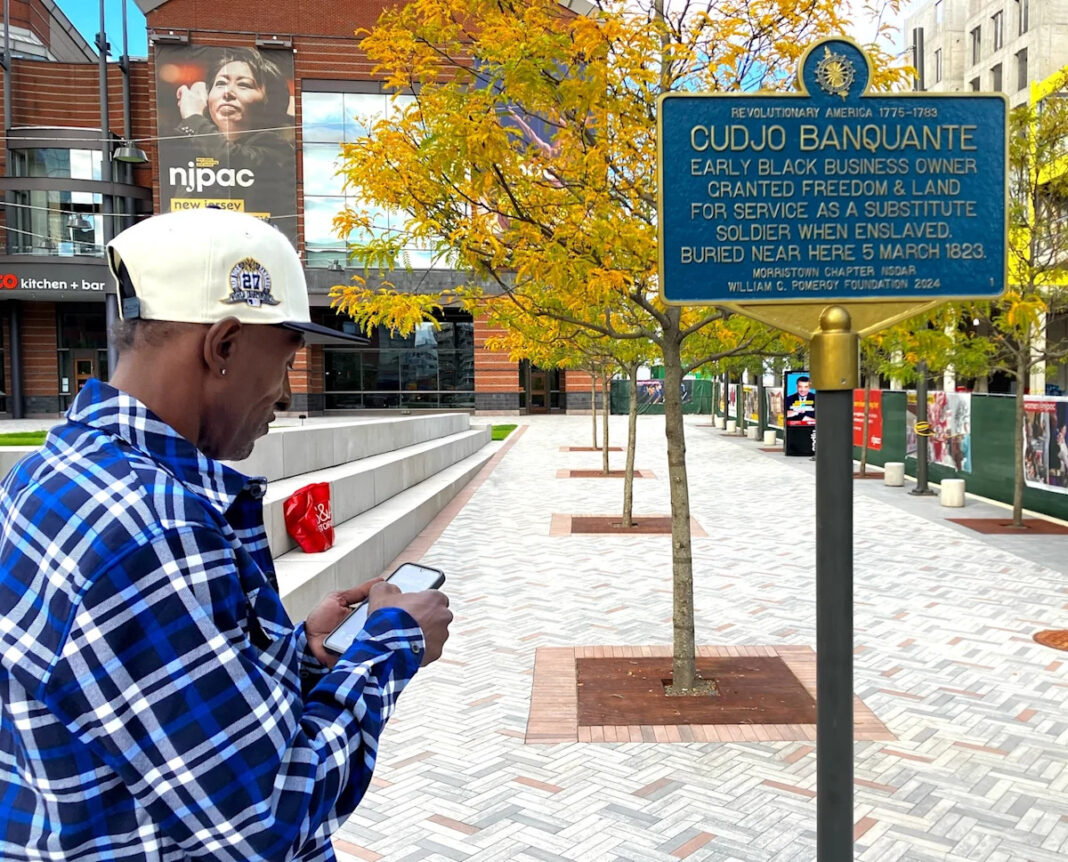Honoring Cudjo Banquante: A Story of Freedom and Legacy
On a sunny afternoon in Newark, New Jersey, Christopher Seals found himself enjoying a peaceful moment outside the New Jersey Performing Arts Center (NJPAC). Little did he know that a short walk would introduce him to a significant piece of history—one long overshadowed by time and circumstance.
Discovering a Forgotten Hero
Seals stumbled upon a historical marker almost obscured by a row of saplings. The marker honors Cudjo Banquante, an enslaved Black man born in Ghana, who earned his freedom by fighting in the American Revolution in place of his enslaver. Banquante’s story is remarkable, not only because of his courageous act but also because it ties him to Newark’s history. With the land he was granted upon gaining his freedom, he became Newark’s first documented Black business owner, establishing a horticultural business long before New Jersey officially abolished slavery.
“I didn’t know who he was,” Seals reflected, revealing the unfortunate obscurity that often surrounds historical figures like Banquante. “That’s a great achievement.”
A Marker of Recognition
The historical marker, a joint initiative by the Morristown chapter of the Daughters of the American Revolution (DAR) and the William G. Pomeroy Foundation, was erected last spring near Banquante’s burial site. This endeavor is part of a broader effort to acknowledge and celebrate the contributions of Black patriots in American history. Linda Caldwell Epps, a social historian involved in the project, emphasized the importance of documenting Banquante’s business, suggesting he may be the first documented Black business owner in New Jersey.
The recent recognition of Banquante has not gone unnoticed; the New Jersey Council on the Humanities awarded the Morristown chapter the 2025 Stanley N. Katz Prize for its impactful community-focused humanities work.
The Legacy of Cudjo Banquante
The blue and gold marker succinctly encapsulates Banquante’s legacy: “Cudjo Banquante, early black business owner granted freedom & land for service as a substitute soldier when enslaved. Buried near here 5 March, 1823.” This acknowledgment highlights not only his entrepreneurial spirit but also his role in the fabric of American independence, further contextualized by the latest symposium titled “Honoring Cudjo Banquante.”
The symposium featured a series of events at NJPAC, local libraries, and historical societies, including presentations from historians, re-enactors, and even descendants of Banquante’s family. All these initiatives brought a contemporary acknowledgement to a historical figure whose contributions have been long overlooked.
Roots in Ghana
Banquante’s story begins across the Atlantic, in the region of Akyem Abuakwa, modern-day Ghana. Kofi Ayim, Banquante’s biographer, notes that he likely was captured in tribal conflicts and sold to slavers. His name, derived from the line of royals in Akyem, emphasizes his noble lineage. His involvement in the American Revolution adds a complex layer to his identity, marking him as not just a victim of enslavement but a significant participant in the fight for freedom.
Evolution of Historical Recognition
The honor bestowed upon Banquante is emblematic of the DAR’s evolving narrative. Founded in 1890, the organization initially focused on preserving the stories of White Revolutionary War veterans. Over the decades, however, the DAR has sought to diversify its membership and the stories it honors, culminating in the establishment of initiatives aimed at recognizing underrepresented figures in American history.
Bobbi Bailey, a state DAR official, spearheaded the campaign to honor Banquante after encountering his intriguing name while researching Revolutionary War veterans. Her curiosity led her to a deeper investigation, ultimately turning into a broader mission within the DAR.
The Impact of Representation
Christopher Seals’s reaction upon discovering Banquante’s story highlights the emotional resonance that comes with representation. “Obviously, he was great,” he stated, feeling inspired by the idea of a Black man successfully running a business in a historical context that often overlooks such achievements. “That inspires me,” he added, showing his determination to share Banquante’s narrative.
Seals’ commitment to spreading the word about Banquante’s accomplishments emphasizes the importance of historical recognition and the way it can inspire future generations.
An Ongoing Journey
As the marker stands in the plaza, it serves as a reminder of the complex history of Newark and the rich tapestry of the American experience. The tribute to Cudjo Banquante invites passersby to reflect on the contributions of individuals often erased from the mainstream narratives of history. His story is one of resilience, bravery, and entrepreneurship—a true testament to the human spirit in the face of adversity.
The ongoing efforts to illuminate Banquante’s legacy underscore a collective mission to honor not just the prominent icons of history, but also the everyday heroes whose contributions shaped the world we know today.



